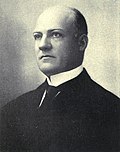Campaign
The campaign heavily centered around the free silver movement, which handed presidential candidate William Jennings Bryan a landslide victory in the state in 1896, as well as labor, trusts, tariffs, and international politics due to the US's conquest of both Cuba and the Philippines.
Campaigning didn't take place until the last few days of the election, October 31 to November 6, in which Utah newspapers covered dozens of events each day. The Democrats accused Wells of being against free silver, as well as accusing him of wanting to get national bank notes accepted as money, thus ruining silver mining. Republicans accused Democrats of being populist, and just throwing "free silver" around as a way to catch votes. Republicans did not believe free silver would lead to prosperity, but still favored some action in favor of it anyway. Generally, state Republicans did follow many Democratic policies, but claimed they were the ones that actually got said policies passed. [2]
On the topic of the Philippines, Governor Wells praised the work of volunteers who fought in the Philippines in Manti, and claimed for a way to preserve their sacrifice was to vote Republican. State Republicans further capitalized on the issue by holding a rally with both Philippines and Civil war veterans in Salt Lake City. Multiple generals spoke in favor of US expansion in the Philippines, accused Adlai Stevenson I of being a copperhead, and blamed Democrats for being hostile to the nation. Major F.A. Grant was quoted saying, "we ought not to let the tears of the mothers of those boys of ours who died in the Philippines be shed in vain." At the same rally, a black soldier, J Gordon McPherson, made a speech comparing the freeing of African Americans in the Civil War to the liberation of the Cuban people in the Caribbean. However, he claimed that the Filipino people "stabbed their friends in the back" for not wanting to be liberated. State Republicans successfully tied the Civil War and the Philippine issue together for emotional appeal. The Democrats, on the other hand, did not rely heavily on the Philippines issue due to criticisms in the form patriotic pleas, but Moyle still argued against US imperialism in the region as "evil". [3] [4]
On labor, Wells was criticized for vetoing an eight hour work day bill, and state labor organizations refused to back his campaign. He defended himself by stating the bill only affected state and county employees, and that the bill came so late in the session he could not give it proper time to look it over. He also brought up the passage of a similar law that gave miners and smelters eight hour works days, and if another similar bill appeared on his desk, he would sign it. [5] Moyle was reported to have taken the "labor question" for a rally at an opera house in Park City, and gave a speech on why he was for the "working man." [6]
Wells and other Republican candidates ended their campaigns at a Park City rally at the Dewey Theatre, where he spoke generally on local Issues, as well as giving the "true history" explaining his veto of an early eight hour work law, and reviewing Republican legislation. [7] [5] Meanwhile, Democrats concluded their campaign with a rally in Brigham City, were Moyle was given high remarks by Brigham Henry Roberts. [8]
Governor Wells would go on to defeat Moyle with 51% of the vote to Moyle's 48%, a margin of slightly over 3 points; a slight decrease compared to his 5.6 point victory in 1895. His victory, as well as President William McKinley's victory, has been attributed to the good organization and funding of the Utah Republican Party, as well as his position on protective tariffs and support of the conquest of the Philippines. [9]
This page is based on this
Wikipedia article Text is available under the
CC BY-SA 4.0 license; additional terms may apply.
Images, videos and audio are available under their respective licenses.



